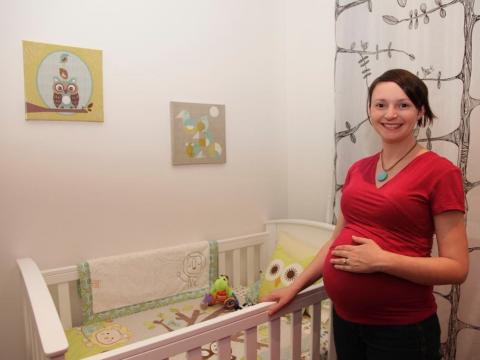Mum’s the word after years of improving maternal health

Thirty weeks’ pregnant with my first child and my midwife asks me the dreaded question, “Have you given any thought to your birth plan?”
Eek. Labour. Childbirth. Things just got very real.
“I’d like a natural birth,” I replied. “With as many drugs as possible…”
What I meant was: Panadeine – yes. Gas – yes. T.E.N.S – yes. Pethidine – yes. Epidural? Yes, please!
Sensing fear she did her best to reassure me, “There’s nothing to worry about. Your body knows what to do; you should trust it,” she said. But how can I believe that when my job tells me another story?
I am the Campaign Leader in Australia for World Vision’s global Child Health Now campaign. Everyday I see harrowing statistics – hundreds of thousands of women dying each year from pregnancy or childbirth-related complications; millions of babies not surviving their first month of life. And let’s not forget those women who do survive birth, only to suffer debilitating injuries or disabilities.
I know my fear is irrational. My journey to motherhood so far is in stark contrast to the millions of women I represent through the campaign.
I know that women living in extreme poverty face unimaginable challenges. While my health is carefully monitored, many women are severely malnourished and iron-deficient during their pregnancies – making childbirth an even greater struggle.
The worst experience for me so far was my first trimester: months of unstoppable vomiting! I got sick if I ate or drank water. I got sick if I didn’t eat or drink water. I even did the whole Kate Middleton thing – an emergency dash to the hospital to get hooked up to a drip and pumped with anti-nausea meds.
It all happened within half hour and got me thinking:
•What if there was no hospital?
•What if I had to pay and couldn’t afford it?
•What if I didn’t have easy access to medicine, food, water?
•What if I didn’t have an understanding manager and plenty of accrued sick-leave?
My local hospital is 15 minutes away, even with a slow traffic light and persistent window washer. I can’t help thinking of Susie from Papua New Guinea, who started the overnight hike to hospital when her labour pains began, and had to paddle across a lake in a canoe to reach medical help.
Even if a pregnant woman reaches hospital, there’s no guarantee she will receive the help she needs. When World Vision Ambassador, Rebecca Gibney, visited a district hospital in Malawi, she met a midwife struggling to provide healthcare to more than 120 mothers each day, without access to running water or stable electricity.
I know that when I give birth [gulp!] I’ll have a team of experts available during and post-delivery. But a worldwide chronic shortage of 7.3 million health workers means many women will be left to birth alone. And that’s when disaster can strike – for mother and baby.
Childbirth is natural, but not all women are able to give birth naturally. Things do go wrong and it is skilled healthcare workers, modern medicines and equipment that can help things go right again. My job at World Vision is about trying to improve access to maternal healthcare, so pregnancy doesn’t have to be a death sentence.
Like I said, I know my fear of childbirth is irrational. It’s more a fear of pain than worry for my life, or my baby’s life. I know I’m in excellent hands. It’s just a travesty that not every woman has that same reassurance.